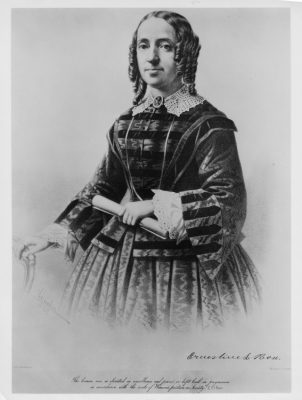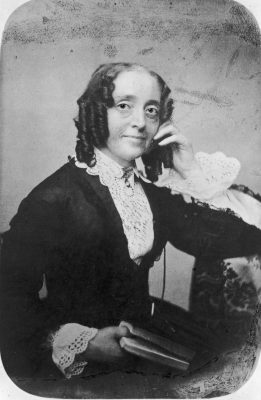Ernestine Rose, the First Jewish Feminist.

Blog post by JMM intern Hannah Balik. To read more posts from JMM interns, past and present, click here.
“Slavery and Freedom cannot exist together” – Ernestine Rose
Next week, interns will be recording podcasts, which is an opportunity for us to talk about anything our hearts desire. I did of research on a few different topics, being the indecisive person that I am. I eventually found a topic but wanted to acknowledge the research I’ve done on previous ideas that I thought were fascinating and deserve to be shared. One of these things is the life of Ernestine Rose. I had not heard of Ernestine Rose before I started looking for podcast topics. Originally, I wanted to focus on Jewish abolitionists, as my senior project in college was on Jewish slaveholders, and it felt like an interesting compliment. I entered a few search terms into PastPerfect, the JMM’s archival database, to see what items in our collection match my topic of interest. I found a single image of Ernestine, with no other information other than her name. Intrigued, and supported by years of research experience, I read her Wikipedia page. I learned that Ernestine was integral to the first wave of feminism and was amongst other great activists of the time such as Susan B Anthony, Elizabeth Cady Stanton, Sojourner Truth, and Frederick Douglass. She is considered the first Jewish feminist and was greatly important to the suffrage movement before she left America in 1869.

Ernestine’s story is one of perseverance and outspokenness. Ernestine was born in the Jewish Quarter of Piotkrow, Russian Poland on January 13, 1810. She was the only child of a Rabbi and the daughter of a wealthy businessman. She received a robust secular and Jewish education. She was a “rebel at age five”, rejecting the religion of her father and questioning the justice of a God who would enact hardships on people, like the many religious fasts her father participated in. By 14, she outright rejected religion and the Jewish texts and traditions that supported the idea that women were inferior to men. When Ernestine was 16 years old, her mother passed away and her father arranged for her to be married. She refused and decided to go to court to have the contract dissolved herself. Through dissolving the courtship, she gained access to her mother’s inheritance, which she ended up giving mostly to her father, only keeping enough for herself to leave Poland.
In 1827 Berlin, the law said that all non-Prussian Jews needed to be sponsored by a German property holder, which Ernestine was not. She appealed directly to the King in order to be exempt from this rule, which he allowed. At this time that she was living alone in Berlin, she developed a room deodorizer that she sold to support herself and her travels. She traveled to Holland, Belgium and France, advocating for the oppressed wherever she traveled. In her travels she met an English man called Robert Owen. Owen was a utopian socialist with followers who refer to their ideology as “Owenism” Ernestine stayed in England for three years, lecturing alongside Owen on the principles on human equality.
Through lecturing with Owen, she met William Ella Rose, an Owenite and jeweler. They married in 1835 and moved to New York the next year. Ernestine continued lecturing widely across the United States, supporting causes such as abolition, religious toleration, public education, and equality for women. Her oral power earned her the nickname “Queen of the Platform.” Once while giving a talk in the south, a slaveholder told her he would have her tarred and feathered, had she been a man. She is also considered to be the first woman to publicly demand that women be given the right to vote in the state of Michigan. In the 1840s and 50s, she banded with a group of activists fighting for women’s rights and for the end of slavery. Some of these people included Elizabeth Cady Stanton, Lucretia Mott, Paulina Wright, Sojourner Truth, William Lloyd Garrison and Frederick Douglass.
The end of the Civil War brought a smaller civil war to suffragettes and activists. Many people, including Frederick Douglass, urged suffragettes to ease their seeking of women’s vote until black men got the vote. Douglass frame this task as an “urgent necessity”. Rose proclaimed that “Emancipation from every kind of bondage is my principle,” She viewed civil rights and the women’s vote to be two sides of the same oppression and aimed to dismantle powers that kept both of those from happening. However, when the fourteenth amendment was passed and only gave men the vote, many women’s leaders took this opportunity to be very publicly racist, like how they couldn’t believe that people like black men and immigrants got the right to vote before “well-heeled American born women.” Rose was quoted harboring anti-immigrant sentiment, although she was an immigrant herself. In 1869, she said “We might commence by calling the Chinaman a man and a brother, or the Hottentot, or the Calmuck [meaning Mongolians], or the Indian, the idiot or the criminal, but where shall we stop? They will bring all these in before us.” However, she did not oppose black men acquiring the ability to vote as much as she was frustrated with the government for continually ignoring women. She framed the situation uniquely, asking “Why do [politicians] not at the same time protect the Negro woman?” Sojourner Truth agreed with Rose, saying, “If colored men get their rights, and not colored women theirs, they will be masters over the women, and it will be just as bad as it was before,”
The Revolution, a magazine run by Stanton and Anthony, and funded by notorious racist George Francis Train, once ran an article that recommended keeping “the Jews and the Chinese” out of the country. It described Jews and Chinese as “voracious, knavish, cunning traders,” and Jews in particular as “a race of mere bloodsuckers.” Rose was not involved in this newspaper, and never responded to their antisemitism, although she was probably aware of it. She did get in a ten-week-long letter exchange with the editor of the Boston Investigator after he said that the Jews were “a troublesome people to live in proximity with”, and that he hoped their numbers would not increase.

Ernestine and her husband moved to England in 1869 for reasons scholars are still unsure of. Carol Kolmerten, in The American Life of Ernestine Rose (1999) speculated that perhaps she felt tired battling anti-Semitism and anti-immigrant sentiment in her “feminist” circles and was frustrated by the racism that her colleagues spat. It is also said that she suffered from rheumatism, and that she was simply too frail to continue lecturing in the matter she was. In 1883, Susan B Anthony and Elizabeth Stanton went to London to visit her and attempt to convince her to return, unsuccessfully. Ernestine continued to give talks in England until her health forced her to retire in 1872. Her husband, William, died in 1882. From then until her death in 1892, she lived in isolation, only seeing a few friends who described her as sad and lonely.
Ernestine’s legacy has fallen out of the public eye. At her time, she was considered one of the most accomplished orators and activists, only to become unknown today. There are a few possible reasons for this – many historians point to her Jewishness in a game played by Protestants, or her immigrant status in a time when nativism was reigning, or maybe the fact that she was an atheist in a religious world. She also left America in 1869, the middle of her colleagues careers, for seemingly no reason and without notice. It is very sad that I had no idea that Ernestine existed and how many contributions she made to modern feminism. It was disappointing to want to learn about the Jewish leaders who came before you, only to be confronted with the short changes of them, like Rose’s anti-immigrant comments. However, we never learn about Ernestine the way that we do other early suffragettes and civil activists, who were much more openly racist and xenophobic, so it was great to open up this piece of history.
